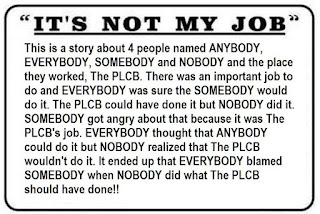The House appropriations committee had the PLCB in for their annual hearing on February 25th, and besides the normal tap-dancing that they do ("Well, sir, it's my personal feeling that we'll meet those goals, yes"), the Chairman of the PLCB let it slip out that the PLCB doesn't really have any buying power.
Ooops! In a response to a question put forth by the Appropriations Committee about where they might be able to find more income, LCB Chair Tim Holden said that because of the current 30% markup structure, the board can't negotiate for the best price. According to Mr. Holden, the manufacturer sets the price they want to sell their product for, and the the PLCB backs down from that through the 30% markup, 18% Johnstown Flood Tax, bottle fees, and whatever other charges they have that they've hidden from you, to come up with a buy price that they will pay. Unlike a real business that tries to get the best possible price and then adds on what it needs to make a profit and cover expenses.
This quote is taken from the Appropriations meeting; you can see it here, at about 2:43 in. Holden says, "People somehow believe that we have the ability to negotiate with the vendors. We have to do it proportionately so we have to have a markup that's consistent. And we believe that the money that can be made by negotiating a better price on different products is where the greatest amount of [increased] money can be achieved."
A little later, Board member Mike Negra backs him up, even more clearly: "The manufacturer sets the MSRP, the manufacturer's suggested retail price, and through the system it's backed down to determine what we pay for that product. Not necessarily your typical retail relationship between us and the manufacturer. We can't really leverage our ability of purchasing, our 'buying power' is not really leveraged in that manner. There are significant dollars, we believe -- it'll take a lot of time, it'll take a real learning experience for our vendors and for our buyers to change that." Remember: Negra is the first Board member in a while to have any actual retail experience!
Section 2-207 (b) of The Liquor Code under General powers of board says: "Prices shall be proportional with prices paid by the board to its suppliers and shall reflect any advantage obtained through volume purchases by the board." Isn't that the definition of 'buying power'? If they aren't negotiating prices, which the Chairman says they are not, just how are they leveraging their volume purchases beyond what the vendor says they will give? As Negra admits, they aren't.
I'm going to say this in really big letters so you can't miss it.
There is no volume discount on standard stocked items, because the goal is to sell them at MSRP.
If you are the 2nd or 3rd largest retail buyer of ANYTHING and don't try to get a better price, then the entire organization needs to be replaced, eliminated, done away with for sheer incompetence.
Do we really need this? Privatize and let real businesses try to save you money by being in competition with other businesses, because they're motivated to keep you as a returning customer...rather than knowing that you have to come to them because that's the law.
Honestly? Sometimes you have to wonder how stupid we all are for putting up with kind of crap for eighty years.









